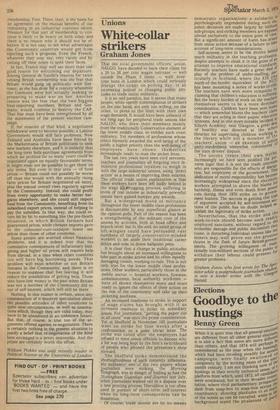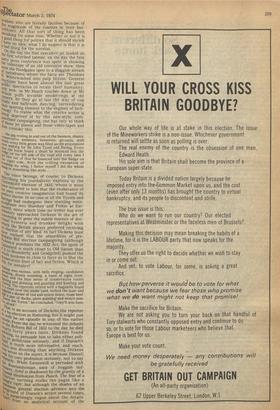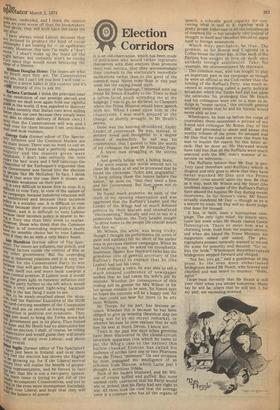Unions
White-collar strikers
Graham Jones
That the local government officers' union, NALGO, have decided to back their claim for a 20 to 26 per cent wages increase — well outside the Phase 3 limits — with overtime bans in London which could seriously disrupt the count on polling day, is an interesting pointer to changing public attitudes to trade union militancy:
It is an odd paradox, but it seems that many people, while openly contemptuous of strikers on the one hand, are only too willing, on the other, to press to the limit with their own wage demands. It would have been unheard of not long ago for peripheral trade unions like NALGO, who draw their members mostly from the traditionally Conservative element of the lower middle class, to exhibit such overt militancy. Yet members of professions whose ethics formerly awarded the well-being of the public a higher priority than the well-being of employees have shown themselves increasingly ready to man the picket lines. The last two years have seen civil servants, teachers and journalists all forgoing once instinctive professional loyalties to weigh in with the large,industrial unions, using 'direct action' as a means of improving their salaries. The official trade union explanation is that these workers have been left badly behind in the wage klifrogging process, suffering in levels of-real income as industrially powerful unions have gained bumper pay awards.
But a widespread mood of militancy throughout the lower middle class professions is discountable by any superficial glance at the opinion polls. Part of the reason has been a strengthening of the militant core of the unions by activists, both at head office and branch level: but in the end, no small group of left-wingers could have persuaded vast numbers of largely conservative-minded workers to set aside their traditional career ethics and vote to down ballpoint pens.
It is clear that a change in public attitudes has brought about an increased willingness to take part in strike action and its often equally damaging cousin, working-to-rule. This is not only true for the lower middle class professions. Other workers, particularly those in the public sector — hospital workers, firemen, ambulancemen, local authority workmen — have all shown themselves more and more ready to ignore the effects of their action on the rest of the community and take up their picketing positions.
An increased readiness to strike in support of wage claims has brought with it an increased readiness to strike on subsidiary issues. For journalists, "getting the paper out at all costs" was once the prime consideration. Yet at Sheffield in November 165 journalists went on strike for four weeks after a confrontation on a quite trivial issue. The strike was called after the employers had refused to meet union officials to discuss why a list was being kept by the firm's switchboard of people who phoned the pressmen's shop steward.
The Sheffield strike demonstrated the shortsightedness of such instantly inflammable militancy: one'of the two papers whose journalists were striking, the Morning Telegraph, was in danger of folding as had the Nottingham Guardian and Journal last July, when journalists walked out in a dispute over a new printing process. Disruption is too often used in pursuit of short-term self-interest when its long-term consequences can be disastrous.
Of course, trade unions are by no means
SAlgtator March 2, 1974 democratic organisations: a solidarity is psychologically engendered during such dis. putes; decisions are made largely by militant sub-groups; and striking members are exposed almost exclusively to the union pont of view. But a significant amount of harm has arisen from union action because of a failure to take account of long-term considerations. Self-interest seems to be the motive behind much militancy in the teaching professi°n. despite attempts to cloak it in the guise of an attempt to improve educational standardsi Recently teachers have made a great deal ° play of the problem of under-staffing, Pa,rticularly in Scotland, where the EIS (t°,.e) north-of-the-border equivalent of the NU" has been mounting a series of works-to-rule. The teachers nave won some sympathY bY claiming that children's education is suffering. But the heavy burden of work on the teachers themselves seems to be a more dominein consideration. Children have been sent horne which somewhat blunts the teachers' clalin that they are acting in their pupils' education. interests. And in one more notable incident at, Kilsyth Academy, near Glasgow, a, great deal, of hostility was directedthe scho°' librarian for supervising chilren working n the library while not a member of teachers' union — an example of uni°'i petty-mindedness somewhat reminiscent 0 the train drivers' dispute. The unions create their own mYtils,.. Increasingly we have seen peddled the verse logic that it is not the trade unionis' who are responsible for the effects of disr°,1?: tion, but employers or the government. Tril"._ abdication of moral responsibility has become increasingly widespread since the electricitYr workers attempted to shove the blame for hardship, illness and even death from P°w„' cuts during their 1970 strike on to gove'-; ment leaders. The success in getting this tyP of argument accepted by self-interested sec tions of the public has no doubt helped es' tablish the legitimacy of strike action. d the Nevertheless, that the strike and should become such reaul„ employed sanctions, without regard to .tneye economic damage and public discomfort t,ri,,e cause, is disturbing.Individual unions like miners may well prove not the greatest thorns in the flesh of future British govell, ments. The growing willingness of traut., lic.ae. tionally non-militant sections of the
pub withdraw their labour could present greater problems.
far Graham Jones, who first wrote for The See_c,: tator while a postgraduate journalism sw tud e is no a leader writer with the Gla Heralds8° Workers who are literally faceless because of the magnitude of the rosettes in their buttonholes. All that sort of thing has been Shrinking for some time. Whether or not it is a, good thing for politics that it should shrink 1 have no idea; what I do suspect is that it is a bad thing for the novelist. the the day the first executive jet landed on , "le first televised tarmac, on the day the first Party press conference was spent in showing the videotape of an old television show, then were the floodgates open to a sluggish stream ?!. melodrama where the facts are Theodore H. Whitewashed into pulp fiction. General elections have been almost the last great Public spectacles to retain their humanity; (1)k1,1,Y now, as Mr Heath touches down or Mr
uson puffs invisible smoke-rings at the
tnera, do they go at last the way of cup !!nals and ballroom dancing, surrendering heir sporting element to the engines of techb°!0gY. To realise what the creative writer is etng deprived of by this new-style, cornPouterised campaigning, one has only to think t,r, those jet planes and those video-tapes and "en consider this: .e'0' the gig tooling in and out of the banners, drums, „Pservative emblems, horsemen, go-carts, with which every little green was filled as the processions re waiting for Sir John Tyrell and Baring. Every te'a,e the horse heard a drum he bounced into the goutke, on the left side of the road and every time I the unn out of that he bounced into the hedge on hreaki right side. With the trifling exception of " tha, N my whip, I flatter myself I did the whole g in something like style. delhe voice belongs, of course, to Dickens, ch'e,ribing his journalistic exploits at the ha,!'n'tsford election of 1835, where it must hisve occurred to him that the exuberance of pe,,,°wri creative imagination had found its t;':ect theme. In no time at all the Tyrells and ra'rIngs had undergone their startling meta4ri°l'Phosis into Slumkey and Fizkin at Eatret,,swill, since which time no writer has ever co—„,?telY approached Dickens in the art of tri-;e,Ying in print the subtle essence of doca/i,"al hysteria and drunken delight with a„"leh the British always preferred receiving 1),"_electi0n of any kind. In fact Dickens must k'evfe realised that the absurdities of pre form Bill election campaigning (although 6._Wick postdates the 1832 Act, the spirit of it'.1`tr1SWill is much closer to Old Sarum than Iwhistp Bounderby and Gradgrind) pushed the hnle business so close to farce as to blur the this,a!‘cation lines of fact and fiction. Which is
for instance?
skalintg was riotous, with bells ringing, candidates bohn Irig, drums sounding, a band of eight tromfigh and the blue swine of conservative voters roar.irig and drinking and guzzling and howling and
„
to a ,,"g. The reporters retired with a bagatelle board orde'oom over the stable yard, locked the door and arid red a dinner of cod and oyster sauce, roast beef, 'be,!Ipair of ducks, plum pudding and mince pies l'an the Tories," he concluded, "they'll win here, that • atak is an account of Dickens the reporter ,,,telection in Kettering, but it might just aov-Alell be an episode in any of the earlier ' t"-Lts. From the day he witnessed the debates Ileatie Reform Bill of 1832 to the day he died Oott,r!Y forty years later, Dickens found 4.s"Ing, to persuade him to take either polibi?r. Politicians seriously, and if Disraell's !bitch is Much more informative, and much, ,ber less diverting than anything Dickens his on the suject, it is because Disraeli %oleri.:ii own profession seriously, not to say the LY. While Eatanswill is pervaded with loon 'nwlandsonian aura of hoggish bufTos-erY. Sybil is shadowed by the gravity of a Ch"niel idealisation from Punch. The fear of a httitrtist uprising stalks the pages like a IratIZ,rY tiger, but although the shades of an f,orepillent general election advance into the i. b,`bund of Disraeli's action several times, Apar; surprisingly vague about the details. — from an analytical account of the
sidelines, undecided, and I think the opinion Rolls are even worse off than the bookmakers. ?nor devils, they will both have red faces the day after.
I have always voted Labour because they are inclined to produce the kind of social Philosophy I am looking for — an egalitarian society. However, this time I'm really a "don't know," I shan't make up my mind till the
ht before, but certainly won't be voting ,TrY since that would mean betraying the 'ueas of a lifetime.
,William Douglas Home: The issues are what "'II' Heath says they are. The Conservatives Will win, but I can't tell you how I will vote — we have a secret ballot in this country and it's rnat immoral of you to ask me. i Barbara Cartland: I think the principal issue 8 the restitution of our prestige abroad and Whether we shall ever again hold our rightful r11ace in the world. (I was appalled to discover
Indi
a recently that Italian cars were selling Getter than our own because they simply were not able to obtain delivery of British cars.) I 13_,raY that the Conservatives will win and I snail vote for them because I am an ti-black
all and mob violence.
, George Gale (former editor of The Spectat'heor): Inflation and the Common Market are
Main issues. There was no need to call an election; the Tories had a perfectly adequate Inaiority and the reasons given were raudulent. I don't take seriously the 'reds acilder the bed' scare and I find ludicrous the t,hancellor of the Exchequer's argument that 1e Government was forced into the election tY People like Mr McGahey. In fact, I think i,"a, t if that were the case then it shows un'elievable weakness on their part. is very difficult to know how to vote. It is tricult to vote Tory, in view of the nature of bee campaign, because industrial relations will embittered and because their incomes [3.cY is a socialist one. It is difficult to vote _lberal because their incomes policy is also ialist, and it is difficult to vote Labour 7cause their incomes policy is nearer to beqg a Tory one than they seem to realise. 1,2wever, those who think that the Common ic'arket is of overriding importance really ave no sensible choice but to vote Labour, 'en if they do so with a very heavy heart. ta,lain Hamilton (former editor of The Specear): The issues are inflation, our deficit, and 'ernal factors ouside the control of this or iss•Y other government.' But the overriding 13nue is industrial relations and it is very imb"rtant for the Conservative Party to win t,,eeause that will give the Labour Party time S ort itself out and move back towards a 2,nre central position. If Labour won it would re-,v,.,e the green light to runaway inflation and cr-„"„,the party further to the left which would wi`,T-e a very awkward 'right-wing' backlash 'met' is the last thing I want to see, "nt to be mealy-mouthed about the situaA half the National Executive of the NUM card-carrying members of the Communist 1.,r.tY and are on record as having said their tivati0n is political not economic. They just want to bring the Tories down but thY,government put in its place. They forced toe issue and Mr Heath had no alternative but c call an election. I shall, of course, be voting a°11servative and would guess they will attain ih,rnaiority of sixty over Labour, and about 4 'rtY overall. t11 Inglis (former editor of The Spectator): th,„,„"ve just been in Ireland, and over there ,
t 'eel the election has shown the English L'e growing up, for if the Liberal -revival tip" they will realise the benefit of propor th"al representation, and be forced to face
The fact that life is not a two-party system. tor!, Main issue is trying to get rid of the briZ4IY incompetent Conservatives, and not to I sh"g,in the even more incompetent Socialists. hiiall vote Liberal and hope that they will the balance of power.


































 Previous page
Previous page